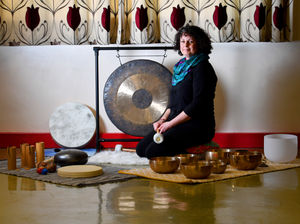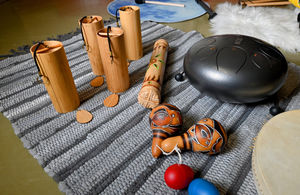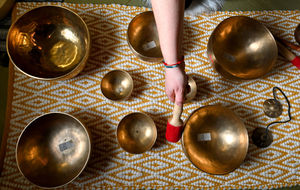Lose yourself in a world of sound
A relaxing soak in the tub isn’t the only kind of bath that can help you unwind.

Sound practitioner Emma Bradbury-Jones holds sessions where she plays gongs, crystal and Tibetan singing bowls, drum, chimes and percussion to aid deep relaxation.
Known as a sound bath, it’s ancient practice that is said to date back more than 2,000 years and has its roots in Tibetan culture.
“A sound bath is a meditative and therapeutic experience where you literally ‘bathe’ in the sounds and vibrations produced by different instruments,” explains Emma, who lives near Newport, Telford. “Through these sounds and vibrations, your mind enters a meditative and relaxed state which brings about healing at a mental, emotional and physical level. All you are asked to do is lie down on a mat with cushions and blankets to keep you warm and let the sound wash over you. You even benefit if you fall asleep.”
Emma, who is also a qualified yoga instructor, has been holding sound baths since 2018.
She first experienced the calming effects of sound during a yin yoga workshop. “Afterwards I felt great and I felt lighter. I was intrigued and I went on a journey to learn more,” she tells Weekend.
Emma, who has been teaching yoga for more than 20 years, completed training with the Sound Therapy Company. Her sounds baths typically last for around 45 minutes and Emma encourages participants to set up “a nest” on the floor with the likes of blankets, cushions and sleeping bags.
“They can use whatever will allow them to be comfortable,” she says. Emma will then begin to play the instruments, which all have different frequencies and vibrations, responding to the energy levels in the room.
“If it’s a very energetic group that have taken a while to settle down, then I will work with lower sounds to calm them down,” she explains.
Unlike with a piece of music, there is no melody or rhythm to the sounds that are played, which allows the brain to switch off.
Her singing bowls each have a different frequency that is aligned to one of the chakras in the human body.
There are said to be seven main chakras, which are focal points of energy, and when these become blocked, it is believed this can affect people’s emotions and wellbeing.

Also among her range of instruments is an ocean drum which contains small ball bearings that move around to create the soothing sounds of the sea. Others include a rainstick that mimics the sound of rain, a tongue drum that plays gentle melodies and four koshi chimes that play a different melody inspired by the four elements – earth, fire, wind and water.
Different sounds will resonate with different people, says Emma, who holds group and one-to-one sessions. “I always tell people to see how they feel and to give it a chance if there is a sound they’re not so keen on. The gong is one that people either love or hate,” she says.
There are clear signs that tell Emma the sound bath is having the desired effect and helping participants to unwind.
“Their breathing really slows down and sometimes there is even snoring. I always end with a period of silence before people leave,” she says.

As well as having a soothing effect on the mind, sound baths are said to offer many other benefits such as improving sleep, focus and concentration, reducing anxiety and boosting mental health.
“During a sound bath, the brainwave state is altered from normal waking state ‘beta’ to relaxed state ‘alpha’, dream-like state ‘theta’ and even restorative state ‘delta’.
“Most people come to a sound bath to just relax. They might be really stressed and it allows them to let go of whatever is worrying them.
“I’ve had people tell me they’ve had the best night’s sleep they’ve had for ages afterwards,” Emma tells Weekend.
Playing the instruments can also provide similar benefits. “If I’m feeling anxious or down, then I find playing the instruments for a bit can really help.
“At the start of a session, I’m making sure everybody is comfortable but by the end I’m feeling the benefits of it and feeling focused and relaxed,” says Emma.
Sound baths are open to anyone and no prior experience of yoga or mediation is needed.
However, precautions should be taken during the early stages of pregnancy, if people have a condition that is sound sensitive, such as tinnitus and epilepsy or any metal implants or a pacemaker – sound can resonate the metal or change the rhythm of a pacemaker. And it’s not always appropriate for people with severe mental health conditions.
Emma also offers forest bathing sessions, a process of relaxation that involves spending quiet, mindful time in nature to improve your wellbeing, and yin yoga, a gentle style of yoga that uses long-held, passive poses.
Forest bathing was first developed in Japan, in the early 1980s as a means to aid the population’s stress due to fast-pace living.
“Being around trees is really beneficial, it’s great for stress-busting, our mental health, and our immune systems,” says Emma, who holds sessions at Weston Park.
Her next sound bath is taking place at Sambrook Village Hall on Friday, March 25 from 6.30pm until 7.30pm.
For more information email wellbeingwitheb@gmail.com or call 07590 437712.





